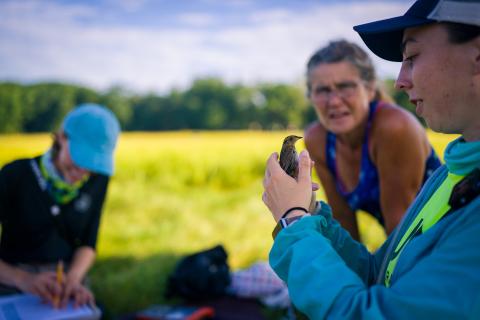What Does it Mean to be a Research University?
Every day at UNH, our faculty and students are working on problems that matter, like building instruments for NASA, or understanding the impact of Pre-K programs on equity in education. That's beacause UNH is an R1 research university with a greater impact on the community, state and world.
But, what exactly does R1 mean? And, how can you get involved in research as a UNH student? Read on to find out.
Keep following our Why UNH? explainer blog series where we break down a different limitless opportunity or top ranking in each post.

Why should I participate in research at UNH?
Do you want to get involved in something bigger on campus? Ever wondered how to work on hands-on projects, or where you can build your resume to prepare yourself for your dream job or graduate program after UNH? These are all reasons to get involved in research at UNH.
“It’s cool to think that even in just one year of research as an undergraduate I have the capacity to advance scientific knowledge in some way.”
Ben Antognetti, Physics
What does R1 mean?
UNH has the prestigious R1 Carnegie Classification, which places us in the highest possible category for university research – for the scope and rigor of our research, but also for its public impact. UNH is among just 146 universities in the nation to hold this distinction.

Can undergraduates get involved with research at UNH?
Many undergraduate students participate in exciting research projects. Two out of every three professors mentor undergraduates on research and more than 2,000 students have the chance to present their research at our annual undergraduate research conference. Professors from our College of Engineering and Physical Sciences visit introductory courses to share their research and get students involved.
"This is the kind of stuff that you do as a master's student and onward, not as an undergrad..."
Caterina roman '22 learn more
How does research help students build community?
UNH students develop one-on-one relationships with professors and peers through research. Many students work in the same lab until graduation.

Do I have to be a STEM major to conduct research?
No! Students in all majors actively participate in research. For example, business students investigated the impact of the pandemic on women in leadership and emerging musicians create the scores for student theater productions.

Where does research take place at UNH?
Research takes place all over campus at UNH, as well as off campus in a variety of unique ecosystems. UNH’s state-of-the-art research facilities include the Chase Ocean Engineering Lab, where students work on dozens of projects, such as testing the efficacy of underwater robots in a wave tank.

Are students paid for their work on research?
There are funded summer research opportunities for students and students can find opportunities to work in research labs like they would any other part-time campus job.
Check out Maeve Kelley's Summer Undergraduate Research Fellowship (SURF)
How does research at UNH impact students after graduation?
Students graduate as co-authors on major research articles, earn admission to some of the nation’s top graduate programs and present at national conferences. Additionally, research tasks such as interviewing subjects and investigating primary sources provide the career-oriented skills students need to land dream jobs.
UNH students help make discoveries that create new ways of thinking and have real-world impacts. Graduating Wildcats look back on their UNH careers and realize that getting involved in research changed everything, from the people they met to the opportunities that opened up for them.